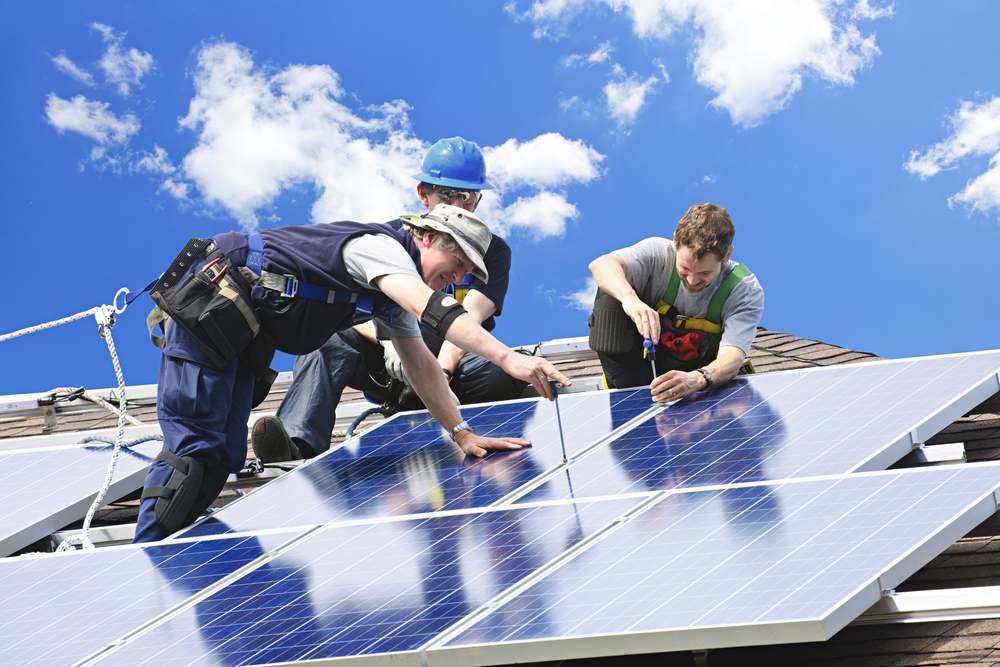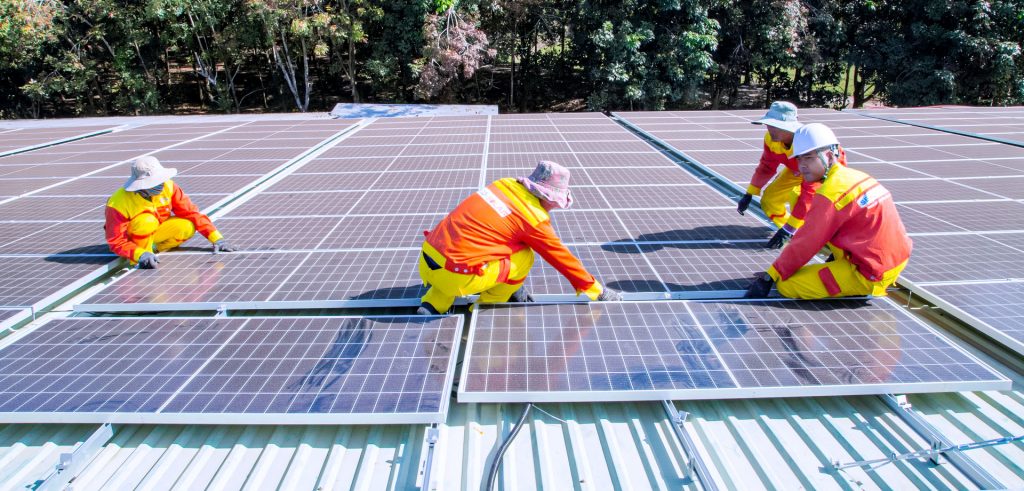Solar energy has become a popular source of renewable energy in recent years. As such, properly cleaning solar panels is an important part of maintaining them and ensuring they are able to operate at optimal efficiency.
This article provides tips on the art of properly cleaning solar panels, so that individuals can make use of this sustainable energy resource with confidence.
The process of cleaning solar panels involves more than just washing off dirt; it requires careful consideration for both safety and effectiveness reasons. In order to ensure that the job is done correctly and efficiently, it is essential to understand the various techniques available and how best to utilize them.
1. The Benefits Of Clean Solar Panels
Clean solar panels can be beneficial in a variety of ways. Regular cleaning helps to ensure that they are performing at optimal levels and taking full advantage of the sun’s energy.
This, in turn, leads to higher energy savings due to greater efficiency.
In addition, clean solar panels have a positive environmental impact by reducing greenhouse gas emissions associated with electricity production from traditional power sources such as coal or natural gas.
Solar panel owners should take the time to inspect their equipment for dirt and debris on a regular basis. Keeping them free from dust buildup will help maximize their performance over time and make sure that they receive adequate exposure to direct sunlight.
Cleaning supplies can also affect the amount of energy produced; using specialized products designed specifically for this purpose is recommended for best results.
2. Proper Safety Procedures

The long-term benefits of maintaining clean solar panels are clear, and now it is essential to understand the importance of safety procedures when cleaning.
For starters, monitoring safety means wearing protective gear like gloves and goggles while handling chemicals or using tools that could potentially cause harm. It also requires taking precautions around electrical connections, such as disconnecting the power source before working with any wirings related to your system’s photovoltaic cells.
Furthermore, avoiding hazards involves inspecting for loose components on the roof that may lead to slips or falls during maintenance work.
Additionally, checking the weather ahead of time can help prevent accidents caused by rain or lightning storms in certain areas. Understanding how your specific type of panel works will ensure you do not damage them either; this includes knowing what kind of cleaners should be used so as to not strip away coating from surfaces over time.
3. Different Cleaning Methods
Solar panel cleaning is an important factor in ensuring optimal performance. To achieve this, it is necessary to develop a suitable cleaning routine and identify the best methods for removing dirt or other deposits from panels.
Frequency of cleaning depends on location, since outside conditions will determine how quickly your solar panels accumulate dust, bird droppings, leaves, etc.
The most common method used to clean solar panels are hosing them down with water; however, there are multiple alternatives available that can be more effective depending on the nature of the dirt. A professional pressure washing service may be beneficial if the surface area covered by your solar panel array is large enough.
For less intense cases of dirt accumulation, brushing off debris or using a squeegee may prove to be sufficient – doing so at least twice yearly should suffice as part of general maintenance. Additionally, chemical agents such as window cleaner and vinegar/water mixtures can also be employed as needed when tougher stains have formed on the glass surfaces due to prolonged exposure to certain elements like salt air or smog.
4. Choosing The Right Cleaning Tools
When it comes to cleaning solar panels, the most efficient and eco-friendly approach is key.
The right cleaning products can make all the difference in the quality of your results.
It’s important to consider which type of materials you will use when cleaning your solar panels – depending on the material used, some solutions may be more effective than others.
To ensure optimal performance from your solar panels, special care must be taken when selecting a cleaner or solution.
Eco friendly products are always best for this job since they won’t damage your panel’s surface or components.
When purchasing a cleanser for your solar panels, look for one that specifically states that it is safe for photovoltaic systems.
There are also several DIY options available such as using water mixed with white vinegar or dish soap diluted with warm water.
Always avoid abrasive cleaners, metal brushes, razor blades, and other tools that could scratch or otherwise damage your panel’s delicate surfaces.
After selecting an appropriate cleaner or solution, take extra precaution when using it by wearing protective gear such as gloves and safety glasses if necessary.
5. Understanding The Cleaning Cycle

Cleanliness of solar panels is essential for optimal energy production.
It is important to understand the cleaning cycle and how it can be managed with minimal effort in order to maintain consistent performance.
Harsh chemicals should not be used when cleaning solar panels as these may cause damage; instead, a damp cloth or soft brush should be used to ensure that dirt, dust, and other soiling buildup are removed from the surface without causing any harm.
It is also recommended to clean your solar panel regularly since this prevents debris and dirt build-up which can reduce their efficiency over time.
Regular checks of the equipment should also be conducted in order to identify potential issues early on and take appropriate action where necessary.
Cleaning cycles will vary depending on environmental conditions such as wind speed, humidity levels, temperature, etc.; therefore close attention must be paid to these factors when deciding on an appropriate schedule for maintenance.
Taking all these considerations into account helps keep your solar system running smoothly while maximizing its energy output capabilities.
6. Optimizing Cleaning Results
Cleaning solar panels is an essential part of a well-maintained photovoltaic system. It’s important to understand the frequency of cleaning and the type of water used in order to optimize your results.
The best way to ensure optimal performance is to clean them regularly, as dust, dirt and other pollutants can drastically reduce their efficiency. Cleaning should be done every three months or when there is visible buildup on the panel’s surface.
Furthermore, it’s important that you use quality water for cleaning; using hard water may cause residue spots due to mineral deposits which could further degrade the performance of the panels. While rainwater can be used, it’s not always available in certain climates and regions so filtered tap water would work just fine.
For those living in areas with frequent storms and heavy rainfall, however, make sure your panels are rinsed after each storm before any debris has time to settle and dry onto its surface.
With proper care and maintenance, you will maximize your solar energy production while extending the life expectancy of your PV system’s components.
7. Addressing Weather Conditions
The sun’s rays provide a plentiful source of energy, but they can also cause damage to solar panels if not properly taken care of. As such, preventative maintenance and seasonal adjustments should be made in order to ensure optimal performance from your system.
By taking the proper steps before inclement weather occurs, you can keep your solar panels clean and functioning at their best. This includes washing them with a mild detergent or vinegar solution and keeping them free from debris like leaves, dirt, dust particles, bird droppings, etc.
Additionally, it is important to adjust your angle of inclination during different seasons – for example winter months may require more tilt than summer months – as this will optimize light exposure and help reduce wear over time.
These simple practices can help protect the efficiency of your solar panel system while preserving its long-term value. With regular upkeep, you can enjoy maximum benefits without worrying about potential damages due to poor maintenance or adverse conditions.

